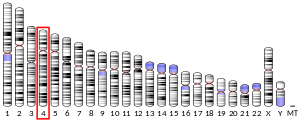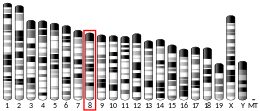INPP4B
Inositol polyphosphate-4-phosphatase, type II, 105kDa is a protein that in humans is encoded by the INPP4B gene.[5]
INPP4B encodes the inositol polyphosphate 4-phosphatase type II, a dual specificity phosphatase. INPP4B is involved in phosphatidylinositol signaling pathways. This enzyme removes the phosphate group at position 4 of the inositol ring from inositol 3,4-bisphosphate. There is limited data to suggest that the human type II enzyme is subject to alternative splicing, as has been established for the type I enzyme.[5]
References
- 1 2 3 GRCh38: Ensembl release 89: ENSG00000109452 - Ensembl, May 2017
- 1 2 3 GRCm38: Ensembl release 89: ENSMUSG00000037940 - Ensembl, May 2017
- ↑ "Human PubMed Reference:".
- ↑ "Mouse PubMed Reference:".
- 1 2 "Entrez Gene: Inositol polyphosphate-4-phosphatase, type II, 105kDa". Retrieved 2012-07-24.
Further reading
- Lopez SM, Hodgson MC, Packianathan C, Bingol-Ozakpinar O, Uras F, Rosen BP, Agoulnik IU (Oct 2013). "Determinants of the tumor suppressor INPP4B protein and lipid phosphatase activities". Biochemical and Biophysical Research Communications. 440 (2): 277–82. doi:10.1016/j.bbrc.2013.09.077. PMC 4578723. PMID 24070612.
- Gewinner C, Wang ZC, Richardson A, Teruya-Feldstein J, Etemadmoghadam D, Bowtell D, Barretina J, Lin WM, Rameh L, Salmena L, Pandolfi PP, Cantley LC (Aug 2009). "Evidence that inositol polyphosphate 4-phosphatase type II is a tumor suppressor that inhibits PI3K signaling". Cancer Cell. 16 (2): 115–25. doi:10.1016/j.ccr.2009.06.006. PMC 2957372. PMID 19647222.
- Hodgson MC, Shao LJ, Frolov A, Li R, Peterson LE, Ayala G, Ittmann MM, Weigel NL, Agoulnik IU (Jan 2011). "Decreased expression and androgen regulation of the tumor suppressor gene INPP4B in prostate cancer". Cancer Research. 71 (2): 572–82. doi:10.1158/0008-5472.CAN-10-2314. PMC 3077543. PMID 21224358.
- Norris FA, Atkins RC, Majerus PW (Sep 1997). "The cDNA cloning and characterization of inositol polyphosphate 4-phosphatase type II. Evidence for conserved alternative splicing in the 4-phosphatase family". The Journal of Biological Chemistry. 272 (38): 23859–64. doi:10.1074/jbc.272.38.23859. PMID 9295334.
- Munday AD, Norris FA, Caldwell KK, Brown S, Majerus PW, Mitchell CA (Mar 1999). "The inositol polyphosphate 4-phosphatase forms a complex with phosphatidylinositol 3-kinase in human platelet cytosol". Proceedings of the National Academy of Sciences of the United States of America. 96 (7): 3640–5. doi:10.1073/pnas.96.7.3640. PMC 22347. PMID 10097090.
- Amato R, Pinelli M, Monticelli A, Miele G, Cocozza S (2010). "Schizophrenia and vitamin D related genes could have been subject to latitude-driven adaptation". BMC Evolutionary Biology. 10: 351. doi:10.1186/1471-2148-10-351. PMC 2996405. PMID 21070662.
- Norris FA, Auethavekiat V, Majerus PW (Jul 1995). "The isolation and characterization of cDNA encoding human and rat brain inositol polyphosphate 4-phosphatase". The Journal of Biological Chemistry. 270 (27): 16128–33. doi:10.1074/jbc.270.27.16128. PMID 7608176.
- Rampersaud E, Damcott CM, Fu M, Shen H, McArdle P, Shi X, Shelton J, Yin J, Chang YP, Ott SH, Zhang L, Zhao Y, Mitchell BD, O'Connell J, Shuldiner AR (Dec 2007). "Identification of novel candidate genes for type 2 diabetes from a genome-wide association scan in the Old Order Amish: evidence for replication from diabetes-related quantitative traits and from independent populations". Diabetes. 56 (12): 3053–62. doi:10.2337/db07-0457. PMID 17846126.
- Fedele CG, Ooms LM, Ho M, Vieusseux J, O'Toole SA, Millar EK, Lopez-Knowles E, Sriratana A, Gurung R, Baglietto L, Giles GG, Bailey CG, Rasko JE, Shields BJ, Price JT, Majerus PW, Sutherland RL, Tiganis T, McLean CA, Mitchell CA (Dec 2010). "Inositol polyphosphate 4-phosphatase II regulates PI3K/Akt signaling and is lost in human basal-like breast cancers". Proceedings of the National Academy of Sciences of the United States of America. 107 (51): 22231–6. doi:10.1073/pnas.1015245107. PMC 3009830. PMID 21127264.
- Zhang X, Majerus PW (Apr 1998). "Phosphatidylinositol signalling reactions". Seminars in Cell & Developmental Biology. 9 (2): 153–60. doi:10.1006/scdb.1997.0220. PMID 9599410.
- Agoulnik IU, Hodgson MC, Bowden WA, Ittmann MM (Apr 2011). "INPP4B: the new kid on the PI3K block". Oncotarget. 2 (4): 321–8. doi:10.18632/oncotarget.260. PMC 3248162. PMID 21487159.
This article incorporates text from the United States National Library of Medicine, which is in the public domain.
This article is issued from
Wikipedia.
The text is licensed under Creative Commons - Attribution - Sharealike.
Additional terms may apply for the media files.



